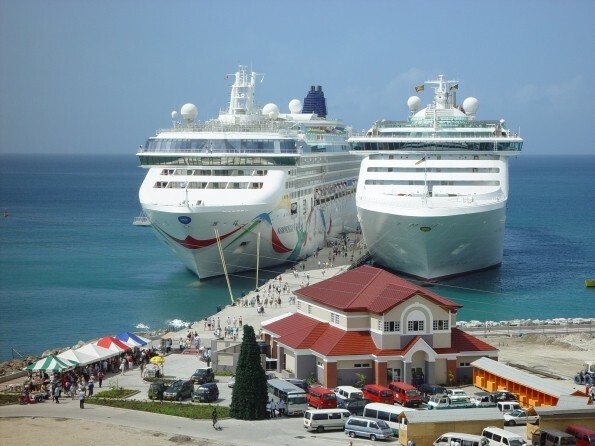 Pull into port, get off the ship. Sun on the beach. Do a little shopping. Ogle the crystal-clear Caribbean waters, the architecture, the quaint town. Swim with dolphins. Then get back on the ship, sail overnight, and do it all again the next day.
Pull into port, get off the ship. Sun on the beach. Do a little shopping. Ogle the crystal-clear Caribbean waters, the architecture, the quaint town. Swim with dolphins. Then get back on the ship, sail overnight, and do it all again the next day.
This may sound like the typical to-do list of a cruise passenger in the Caribbean, but after a while it all starts to look and taste the same. The globalization of the cruise industry, with destinations as diverse as Australia, South Korea and cities on the Black Sea beckoning, has cruise executives warning of increased competition and port officials from Puerto Rico to Mexico’s Yucatan Peninsula seeking ways to stand out.
Gone are the days when the Caribbean attracted passengers just by being there. Although the region is still the biggest cruise destination in the world, dozens of other regions are lobbying to be the next big thing in ship calls, and Caribbean port and tourism officials are acknowledging that cruising’s success may have come back to haunt them.
Over the past few years “the industry has been transformed with globalization,” said Carnival Corporation president and CEO Micky Arison at a press conference last fall. “Ten years ago the industry was very North American-Caribbean-centric. But as economies around the world have grown and travel and tourism have increased, the industry has grown dramatically outside this region.”
With Europe “exploding with growth,” cruise lines are looking for new opportunities in other ports,” he said. “For instance, three ships are based in Dubai and 14 ships are committed to Brazil this winter.”
In contrast, Caribbean calls are flat at best and will in fact drop 3 percent in 2008, Arison predicted.
“Caribbean capacity will be down for the first time in my memory. And that is a direct result of more financially attractive destinations,” he said. “That’s not to say it isn’t still the biggest draw and can’t stay that way.”
As pluses Arison pointed out that the Caribbean has the best weather year-round, the best beaches and at least one of the Seven Wonders of the World (the Mayan archaeological site Chichen-Itzá, which earned the title last July). So there’s “no reason that working together we can’t turn this around and get the growth rate back up,” he said.
Tourism leaders across the Caribbean are adjusting, revamping and expanding their product. Common concerns about passport regulations and the weak dollar have destinations worried that Americans will stay home. On the other hand, the Caribbean is suddenly much cheaper than Europe.
Cruise Industry News interviewed industry leaders from several islands to get a region-wide look at the state of Caribbean cruise tourism, including the effort to create a Caribbean Cruise Association.
Excerpted from the Cruise Industry News Quarterly Magazine: Spring 2008



